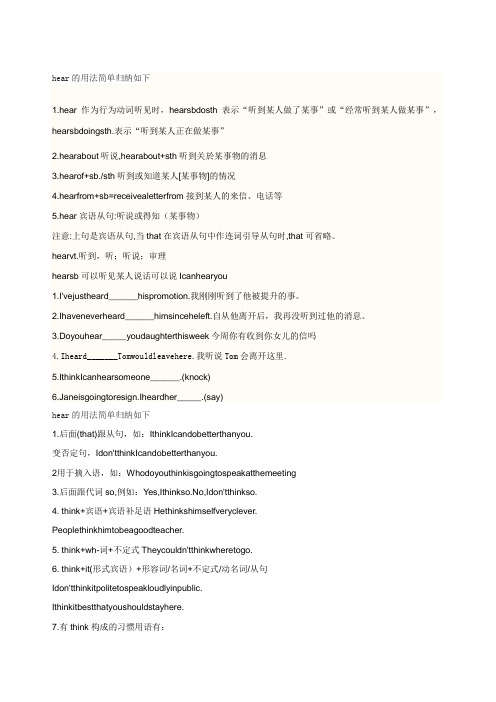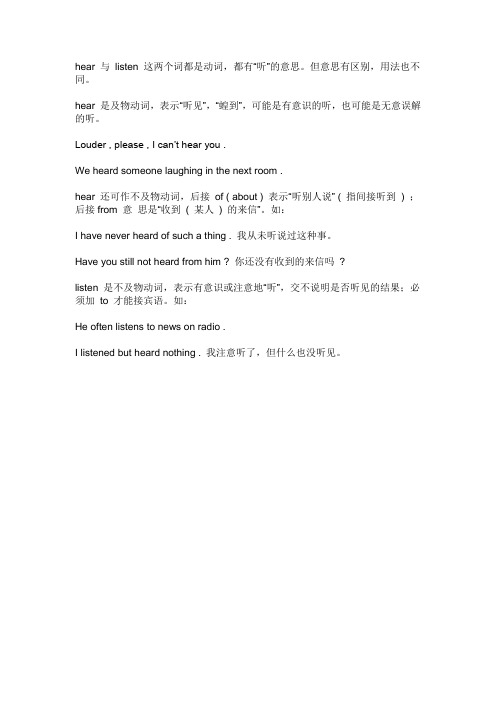hear等词的用法)
- 格式:doc
- 大小:56.00 KB
- 文档页数:6

hear的用法简单归纳如下1.hear作为行为动词听见时,hearsbdosth表示“听到某人做了某事”或“经常听到某人做某事”,hearsbdoingsth.表示“听到某人正在做某事”2.hearabout听说,hearabout+sth听到关於某事物的消息3.hearof+sb./sth听到或知道某人[某事物]的情况4.hearfrom+sb=receivealetterfrom接到某人的来信、电话等5.hear宾语从句:听说或得知(某事物)注意:上句是宾语从句,当that在宾语从句中作连词引导从句时,that可省略。
hearvt.听到,听;听说;审理hearsb可以听见某人说话可以说Icanhearyou1.I'vejustheard______hispromotion.我刚刚听到了他被提升的事。
2.Ihaveneverheard______himsinceheleft.自从他离开后,我再没听到过他的消息。
3.Doyouhear_____youdaughterthisweek今周你有收到你女儿的信吗4.Iheard_______Tomwouldleavehere.我听说Tom会离开这里.5.IthinkIcanhearsomeone______.(knock)6.Janeisgoingtoresign.Iheardher_____.(say)hear的用法简单归纳如下1.后面(that)跟从句,如:IthinkIcandobetterthanyou.变否定句,Idon'tthinkIcandobetterthanyou.2用于摘入语,如:Whodoyouthinkisgoingtospeakatthemeeting3.后面跟代词so,例如:Yes,Ithinkso.No,Idon'tthinkso.4. think+宾语+宾语补足语Hethinkshimselfveryclever.Peoplethinkhimtobeagoodteacher.5. think+wh-词+不定式Theycouldn'tthinkwheretogo.6. think+it(形式宾语)+形容词/名词+不定式/动名词/从句Idon'tthinkitpolitetospeakloudlyinpublic.Ithinkitbestthatyoushouldstayhere.7.有think构成的习惯用语有:thinkabout考虑,想到某人或某事,如:Hewasthinkingaboutamathsproblem.thinkof想,想到,如:Wemustnotthinkonlyofourselves.WhatdoyouthinkofthisT-shirt8.thinkover仔细考虑,如:Hethoughtitoverandrememberedthathehadleranedtheword"plough".9.think还有打算、想到的意思,其后常跟动词不定式,例如:WhenIthoughttoreturn,itwastoolate.10. 关于think的反意疑问句主语是第一人称:Ithinkheisright,isn'the主语是第二,三人称:Theydon'tthinkI'mright,dotheyuse的用法简单归纳如下edtodosth.意为"过去常常做某事",它表示过去经常发生的动作或存在的状态,而现在已不再发生或存在。

的用法简单归纳如下hear“”“hear sb do sth1.hear经常听到某人做某作为行为动词听见时,听到某人做了某事表示或”“”hear sb doing sth.听到某人正在做某事,事表示2.hearabout ,hear about + sth 听到关於某事物的消息听说3.hear of + sb./sth [] 的情况听到或知道某人某事物4.hear from + sb=receive a letter from 电话等接到某人的来信、5.hear : 听说或得知(某事物)宾语从句: ,that,that 可省略。
当注意在宾语从句中作连词引导从句时上句是宾语从句hear vt. 听到,听;听说;审理hear sb I can hear you可以说可以听见某人说话1. I've just heard ______his promotion. 我刚刚听到了他被提升的事。
2. I have never heard ______ him since he left. 自从他离开后,我再没听到过他的消息。
3. Do you hear _____ you daughter this week? ? 今周你有收到你女儿的信吗4. I heard _______Tom would leave here. Tom.会离开这里我听说5. I think I can hear someone ______.( knock)6. Jane is going to resign. I heard her_____.( say)hear的用法简单归纳如下1. 后面(that)跟从句,如:I think I can do better than you .变否定句,I don't think I can do better than you.2用于摘入语,如:Who do you think is going to speak at the meeting?3. 后面跟代词so,例如:Yes ,I think so . No,I don't think so.4. think +宾语+宾语补足语He thinks himself very clever.People think him to be a good teacher.5. think +wh-词+不定式They couldn't think where to go .6. think + it(形式宾语)+形容词/名词+不定式/动名词/从句I don't think it polite to speak loudly in public.I think it best that you should stay here.7. 有think 构成的习惯用语有:think about 考虑,想到某人或某事,如:He was thinking about a maths problem.We must not think only of ourselves. think of 想,想到,如:What do you think of this T-shirt? 仔细考虑,如:8. think overplough. He thought it over and remembered that he had leraned the word还有打算、想到的意思,其后常跟动词不定式,例如:9. thinkWhen I thought to return,it was too late.think的反意疑问句10. 关于I think he is right, isn't he?主语是第一人称:They don't think I'm right,do they?主语是第二,三人称:use的用法简单归纳如下1. used to do sth.意为过去常常做某事,它表示过去经常发生的动作或存在的状态,而现在已不再发生或存在。

listen和hear的用法“哎呀,老师,这个 listen 和 hear 到底咋用啊,我老是弄混。
”小明皱着眉头问道。
好啦,小明,别着急,听老师给你慢慢说哈。
listen 和 hear 呢,虽然都和听有关,但它们的用法还是有些区别的。
首先说 listen,它强调的是听的动作,是有意识地去听,常常和 to 搭配使用。
比如说“Listen to me”,就是“听我说”的意思,这就是在让对方集中注意力来听。
再比如“Listen to the music”,表示专注地去听音乐。
然后咱看看 hear,它主要是指听到了某个声音或者信息,更侧重于结果。
比如说“I heard a strange noise”,我听到了一个奇怪的声音,强调的是听到这个事实。
举个例子来说吧,你正在聚精会神地听老师讲课,这个时候你就是在listen to the teacher,但是当老师讲了一个笑话,你听到并且笑了,这时候就可以说 you heard the joke。
再比如说,你在家做作业,你妈妈在客厅叫你,你可以说“I am listening to my mom”,表示你正在听妈妈叫你;而当你听清妈妈说的内容,比如让你出来吃饭,那你就可以说“I heard my mom say that we should have dinner”。
还有哦,有时候我们会说“try to listen”,意思是努力去听,试着去听,而“hear about”则表示听说关于什么的事情。
比如说“I heard about the accident”,我听说了那个事故。
总之呢,记住 listen 重点在听的动作和过程,要与 to 搭配;hear 重点在听到的结果。
多练习练习,你肯定就能分得清楚啦。

hear的形容词形式及其用法分析hear是一个常用的英语动词,表示“听到,听见,得知,审理”等意思。
hear的形容词形式有两种,一种是hear的过去分词heard,另一种是hear的现在分词hearing。
这两种形容词形式都可以用来修饰名词或代词,表示“被听到的,听说的,听力的,审理的”等含义。
本文将介绍hear的形容词形式的用法和例句,并比较heard和hearing之间的区别和联系。
heardheard是hear的过去分词,也可以作为形容词使用。
作为形容词时,heard通常表示“被听到的,听说的”等意思。
例如:He is a well-known and widely heard radio presenter. 他是一个知名而广受欢迎的电台主持人。
hearinghearing是hear的现在分词,也可以作为形容词使用。
作为形容词时,hearing通常表示“听力的,审理的”等意思。
例如:He has a hearing problem. 他有一个听力问题。
She wears a hearing aid. 她戴着助听器。
The hearing of the case was postponed. 这个案件的审理被推迟了。
He was granted a fair hearing. 他得到了公正的审判。
hearing还可以用来构成一些固定短语或习惯用法,例如:hearing loss:听力损失。
如:He suffered from hearing loss due to loud noise. 他因为噪音太大而导致听力损失。
hearing test:听力测试。
如:She took a hearing test at the hospital. 她在医院做了一个听力测试。
public hearing:公开听证会。
如:The committee held a public hearing on the issue. 委员会就这个问题举行了一个公开听证会。

hear 与listen 这两个词都是动词,都有“听”的意思。
但意思有区别,用法也不同。
hear 是及物动词,表示“听见”,“蝗到”,可能是有意识的听,也可能是无意误解的听。
Louder , please , I can’t hear you .
We heard someone laughing in the next room .
hear 还可作不及物动词,后接of ( about ) 表示“听别人说” ( 指间接听到) ;后接from 意思是“收到( 某人) 的来信”。
如:
I have never heard of such a thing . 我从未听说过这种事。
Have you still not heard from him ? 你还没有收到的来信吗?
listen 是不及物动词,表示有意识或注意地“听”,交不说明是否听见的结果;必须加to 才能接宾语。
如:
He often listens to news on radio .
I listened but heard nothing . 我注意听了,但什么也没听见。

hear的动词过去式和过去分词hear有听说;得知等意思,那么你知道hear的动词过去式和过去分词是什么吗?下面是店铺为你整理的hear的动词过去式和过去分词,希望大家喜欢!hear的动词过去式和过去分词过去式: heard过去分词: heardv.听到,听见( hear的过去式和过去分词 ); 听说; 得知; 听取过去分词:heard的常见句型1. He stood emotionless as he heard the judge pass sentence.他面无表情地站在那里,听法官宣布判决。
2. Flying at 1,000 ft. he heard a peculiar noise from the rotors.在1,000英尺的高度飞行时,他听到旋翼发出一种奇怪的噪音。
3. Rose heard the familiar voice, but tuned out the words.罗斯听到了熟悉的声音,但没注意听说的是什么。
4. He heard tires squeal as the car braked to avoid a collision.为避免相撞而刹车时,他听到了轮胎与地面刺耳的摩擦声。
5. I heard the engines revving as the lorries backed and turned.卡车倒车和掉头的时候,我听见发动机的轰鸣声。
6. She had heard the news-flash on a TV channel's news update.她在一家电视台的新闻快讯中听到了这则简明新闻。
7. I heard them coming, crashing through the undergrowth, before I saw them.还没看到他们,我便听到他们穿过矮树丛过来的声音。
8. As they pass by, a piteous wailing is heard.他们经过时,响起了令人哀怜的恸哭。
感官动词1.see, hear, listen to, watch, notice等词,后接宾语,再接省略to的动词不定式或ing形式。
前者表全过程,后者表正在进行。
see sb do sth 看到某人做了某事see sb doing sth 看到某人在做某事hear sb do sth 听到某人做了某事hear sb doing sth 听到某人在做某事以此类推...I heard someone knocking at the door when I fell asleep. (我入睡时有人正敲门,强调当时正在敲门)I heard someone knock at the door three times. (听到有人敲门的全过程)注:若以上词用于被动语态,须将省略的to还原:see sb do sth----sb be seen to do sthhear sb do sth----sb be seen to do sth以此类推...We saw him go into the restaurant. → He was seen to go into the restauran t.I hear the boy cry every day. → The boy is heard to cry every day.2.感官动词look, sound, smell, taste, feel可当系动词,后接形容词。
He looks angry.His explanation sounds reasonable.The cakes smell nice.The dishes taste delicious.The silk feels smooth.注:如果加介词like构成词组,则后不可接形容词,而接名词或代词:sound like 听起来像...look like 看起来像...He looks like his mother.That sounds like a good idea.It sounds like great fun.It smells like a flower.It tastes like salt.3.如何判断look是实义动词还是感官动词?当look理解为"看起来"时,是感官动词,后接形容词.The naughty boys broke the window. The teacher looked angry.当look理解为"看"或者与其它词构成词组时,是实义动词,需要用副词修饰. The teacher looked angrily at the naughty boys.。
hear的用法Hear是一個常用的英文動詞,其主要意思是「聽到」或「聽見」,而且還有許多其他的意思和用法。
在這裡,我們將探討hear的各種用法和例句。
1. 聽到聲音或聲音的來源hear用於表達聽到聲音或聲音的來源,這是它最常見的用法。
以下是一些例句:- Did you hear that noise? (你聽到那個聲音了嗎?)- I heard a strange sound coming from the attic. (我聽到一個奇怪的聲音從閣樓傳來了。
)- She couldn't hear what he was saying because of the loud music. (因為音樂聲太大,她聽不清他在說什麼。
)- Can you hear me now? (現在你能聽到我說話了嗎?)2. 聽到某人說話除了聽到聲音或聲音的來源,hear也可以用於表達聽到某人說話。
以下是一些例句:- I didn't hear what he said because I was standing too far away. (因為我站得太遠了,所以我沒聽清他說了什麼。
)- She heard her boss yelling at her from across the room. (她聽到她的老闆在房間另一邊對她大喊大叫。
)- I heard my son whispering on the phone late at night. (我聽到我兒子在深夜裡低聲咕噥的聲音。
)- Did you hear what the teacher just said? (你聽到老師剛才說的話了嗎?)3. 聽取建議或聽取指示hear還可以用於表示聽取建議或聽取指示。
以下是一些例句:- You should hear what your friends have to say before making a decision. (在做出決定之前,你應該聽聽朋友們的意見。
hear的第三人称单数hear做动词有得知;倾听;听到;听证等意思,那么你知道hear的第三人称单数是什么吗? 下面跟着店铺一起来学习一下吧。
hear的第三人称单数:hearshear的用法:hear的用法1:hear的基本意思是“听”,强调的是“听”的结果,即“听见”,引申还可表示“听说”“得知”,指收到某种信息。
hear用作及物动词接名词或代词作宾语时,表示无意识地亲耳听到某种声音; 宾语指人时,表示听到某人发出的某种声音(如讲话声、唱歌声、读书声、走路声、敲门声等)。
hear的用法2:hear是感觉动词,指感受到的结果,一般不用于进行体。
hear的用法3:hear后还可接that从句或疑问词引导的从句作宾语。
hear的用法4:hear后可接复合宾语,宾语补足语可以是不带to 的动词不定式、现在分词或过去分词。
跟含不带to的动词不定式的复合宾语,指听到整个行动或事件,常暗示故意听; 跟含现在分词的复合宾语,指听到行动或事件的一部分或正在进行的动作,常暗示偶然听到; 而动词的过去分词充当宾语补足语则含有被动意义。
hear第三人称单数例句:1. That's not the kind of talk one usually hears from accountants.会计们通常不会说那样的话.2. "Is she coming back?" — "Maybe. No one hears from her."“她快回来了吗?”——“也许吧。
都还没信儿呢。
”3. If she hears what you're saying, she's going to come unglued.她听到你们的话会崩溃的。
4. She hears the discomfort in his voice.她听出了他声音中的窘迫。
5. He'll go loopy when he hears!他听了会气坏的!6. Her ladyship will not be pleased when she hears about this.若夫人听说此事,会不高兴的.7. The officer on the beat picks up information; hears cries for help; makes people feel safe.值勤警员注意观察情况,对救援呼叫及时反应,确保让百姓有一种安全感。
hear的用法简单归纳如下作为行为动词听见时,hear sb do sth表示“听到某人做了某事”或“经常听到某人做某事”,hear sb doing sth.表示“听到某人正在做某事”about 听说,hear about + sth 听到关於某事物的消息of + sb./sth 听到或知道某人[某事物]的情况from + sb=receive a letter from 接到某人的来信、电话等宾语从句: 听说或得知(某事物)注意: 上句是宾语从句,当that在宾语从句中作连词引导从句时,that可省略。
hear vt. 听到,听;听说;审理hear sb可以听见某人说话可以说I can hear you1. I've just heard ______his promotion. 我刚刚听到了他被提升的事。
2. I have never heard ______ him since he left. 自从他离开后,我再没听到过他的消息。
3. Do you hear _____ you daughter this week 今周你有收到你女儿的信吗4. I heard _______Tom would leave here. 我听说Tom会离开这里.5. I think I can hear someone ______.( knock)6. Jane is going to resign. I heard her_____.( say)hear的用法简单归纳如下1. 后面(that)跟从句,如:I think I can do better than you .变否定句, I don't think I can do better than you.2用于摘入语,如:Who do you think is going to speak at the meeting3. 后面跟代词so,例如: Yes ,I think so . No,I don't think so.4.think +宾语+宾语补足语 He thinks himself very clever.People think him to be a good teacher.5.think +wh-词+不定式 They couldn't think where to go .6.think + it(形式宾语)+形容词/名词+不定式/动名词/从句I don't think it polite to speak loudly in public.I think it best that you should stay here.7. 有think 构成的习惯用语有:think about 考虑,想到某人或某事,如:He was thinking about a maths problem.think of 想,想到,如: We must not think only of ourselves.What do you think of this T-shirt8. think over仔细考虑,如:He thought it over and remembered that he had leraned the word "plough".9. think 还有打算、想到的意思,其后常跟动词不定式,例如:When I thought to return,it was too late.10.关于think的反意疑问句主语是第一人称:I think he is right, isn't he主语是第二,三人称:They don't think I'm right,do theyuse的用法简单归纳如下1. used to do sth.意为"过去常常做某事",它表示过去经常发生的动作或存在的状态,而现在已不再发生或存在。
hear的用法简单归纳如下1.hear作为行为动词听见时,hear sb do sth表示“听到某人做了某事”或“经常听到某人做某事”,hear sb doing sth.表示“听到某人正在做某事”2.hear about 听说,hear about + sth 听到关於某事物的消息3.hear of + sb./sth 听到或知道某人[某事物]的情况4.hear from + sb=receive a letter from 接到某人的来信、电话等5.hear 宾语从句: 听说或得知(某事物)注意: 上句是宾语从句,当that在宾语从句中作连词引导从句时,that可省略。
hear vt. 听到,听;听说;审理hear sb可以听见某人说话可以说I can hear you1. I've just heard ______his promotion. 我刚刚听到了他被提升的事。
2. I have never heard ______ him since he left. 自从他离开后,我再没听到过他的消息。
3. Do you hear _____ you daughter this week? 今周你有收到你女儿的信吗?4. I heard _______Tom would leave here. 我听说Tom会离开这里.5. I think I can hear someone ______.( knock)6. Jane is going to resign. I heard her_____.( say)hear的用法简单归纳如下1. 后面(that)跟从句,如:I think I can do better than you .变否定句,I don't think I can do better than you.2用于摘入语,如:Who do you think is going to speak at the meeting?3. 后面跟代词so,例如:Yes ,I think so . No,I don't think so.4. think +宾语+宾语补足语He thinks himself very clever.People think him to be a good teacher.5. think +wh-词+不定式They couldn't think where to go .6. think + it(形式宾语)+形容词/名词+不定式/动名词/从句I don't think it polite to speak loudly in public.I think it best that you should stay here.7. 有think 构成的习惯用语有:think about 考虑,想到某人或某事,如:He was thinking about a maths problem.think of 想,想到,如:We must not think only of ourselves.What do you think of this T-shirt?8. think over仔细考虑,如:He thought it over and remembered that he had leraned the word "plough".9. think 还有打算、想到的意思,其后常跟动词不定式,例如:When I thought to return,it was too late.10. 关于think的反意疑问句主语是第一人称:I think he is right, isn't he?主语是第二,三人称:They don't think I'm right,do they?use的用法简单归纳如下1. used to do sth.意为"过去常常做某事",它表示过去经常发生的动作或存在的状态,而现在已不再发生或存在。
这个短语含有今昔对比之意,其否定形式常用used not to或didn't use to。
反意疑问句中应该用did/didn't或used/usedn't。
例如:I used to _____ in this river when I was young.我年轻时常在这条河里游泳。
They used to _____ good friends, _______ they?他们过去是好朋友,是吗?2. be used to sth. / doing sth.意为"习惯、适应某事/做某事",它表示习惯于某一客观事实或状态,其中to是介词,后面跟名词、代词或动名词;be used可用于多种时态;如强调动作可用get或become替换be。
例如:Old people are used to _______ up early in the morning.老年人习惯早晨很早起床。
I wasn't used to city life, but now I have got used to ________ in this city.我以前不习惯都市生活,但现在我已习惯住在这座城市了。
3. be used to do sth.意为"被用来做某事",其中use表"使用"之意,是被动语态形式,to是动词不定式符号。
例如:Wood can be used to make paper.树木可以用来造纸。
4. be used for...意为"被当做……",其中use表"使用"之意,是被动语态形式。
例如:The seal's fur can be used for coats.海豹皮可当做大衣用。
5. be of use意为"有用的",其中use是名词,可用形容词来修饰。
例如:The dictionary is of great use to the students.这本字典对学生们很有用。
6. be in use意为"在使用",其中use也是名词。
例如:The laboratory is in use until three o'clock.实验室一直到3点钟都有人使用。
7. make use of sth.意为"利用、使用某物",其中use也是名词,可用good, full, more, little等形容词来修饰。
同学们应特别注意它的被动形式。
例如:We must make full use of time to study.我们必须充Ⅰ. 单项选择。
( )1. The fashion show is ____ wonderful ____ we all like it.A. too; toB. so; thatC. such; thatD. very; that( )2. —Would you like to have a look at some pants? They may fit you well.—Well, I’d like to try those blue ____.A. pairsB. oneC. pantD. pair( )3. The girl wanted to make a lot of money ____ she could buy the silk cheongsam.A. andB. butC. so thatD. because ( )4. The man is ____ than his father.A. handsomeB. much handsomeC. more handsomeD. more handsomer( )5. His parents don’t allow him ____.A. smokeB. to smokeC. smokingD. smokes( )6. —____ do you wear? —Size XL.A. What colorB. How sizeC. How muchD. What size ( )7. Tom said he ____ at that time.A. is cookingB. cookedC. was cookingD. cooks( )8. I don’t know ____.A. where the shop isB. where is the shopC. how can I get thereD. how do you get there( )9. People should ask the police for help when they are ____.A. in dangerousB. in safetyC. in dangerD. in safe( )10. The policewoman stopped the man from ____ something bad.A. doB. doingC. doesD. will do( )11. Is there ____ in today’s show?A. something interestingB. interesting somethingC. interesting anythingD. anything interesting( )12. —Excuse me, could you tell me ____?—There’s a bank on the second floor. You can do it there.A. where I can change moneyB. how I can get to the bankC. if there’s a bank near hereD. where the bank is( )13. The reporter was busy ____ the famous model.A. interviewingB. interviewsC. interviewedD. interview ( )14. Kate is a little fat. Her mother advises her ____ clothes in dark colors.A. wearB. to wearC. wearingD. wears( )15. Beijing is in the ____ part of China.A. southB. northC. southernD. Northern ( )16. I've never heard ____him before, however,I saw him running on the playground yesterday.A. fromB. ofC. aboutD. out( )17.----Anything else? ----______________A. No,that's all.B. Sure, that all.C. OK,I'm full.D. It doesn't matter. ( )18. Wait a moment,please. It ____about five minutes to prepare your dishes.A. spendsB. costsC. will payD. will take( )19.They really need a house _______.A. liveB. to liveC. to live inD. Lived( )20. Think it over before ______ important decisions.A. to makeB. makeC. makingD. makesⅡ. 情景交际。